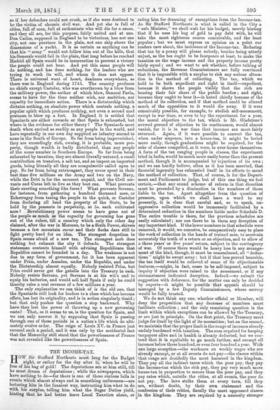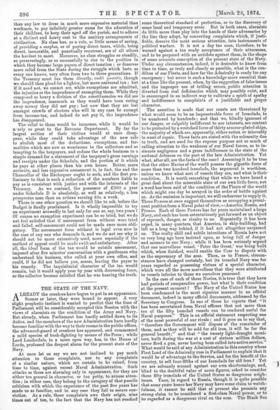THE INCOME-TAX. H OW Sir Stafford Northcote must long for the
Budget night, or rather for the day after it, when he will be free of his bag of gold! The deputations are at him still, till he must dream of deputations ; while the newspapers, which have nothing to do—for there is one of those curious lulls in events which almost always end in something unforeseen—are lecturing him in the funniest way, instructing him what to do with his surplus, telling him what the Sugar Duties yield, hinting that he had better leave Local Taxation alone, or rating him for dreaming of exemptions from the Income-tax. As Sir Stafford Northcote is what is called in the City a "safe Minister," we shall wait for his budget, merely hinting that if he uses his bag of gold to pay debt with, he will take the most righteous coarse conceivable, and the least popular ; but we must express an opinion on a point our readers care about, the incidence of the Income-tax. Reducing that tax by a penny will please nobody, besides being utterly unjust, as the tax ought to be fourpence at least, to make the taxation on the wage income and the property income pretty fairly equal ; and we want to ask whether, before talking of reductions, the Revenue Commissioners are fully convinced that ib is impossible with a surplus to risk any serious altera- tion in the method of collecting. The tax, which we hold to be both expedient and right in itself—expedient, because it shows the people visibly that the rich are bearing their fair share of the public burden ; and right, because they ought to bear it—is hated chiefly because of the method of its collection, and if that method could be altered much of the opposition to it would die away. If it were conceivably possible, for example, to abolish self-assessment, except in war time, or even to try the experiment for a year, the moral objection to the tax, which is Mr. Gladstone's avowed ground of objection to its continuance, would almost vanish, for it is in war time that incomes are most fairly returned. Again, if it were possible to convert the tax, when under sixpence, into a house-tax, it might be levied more easily, though graduations might• be required, for the sake of classes compelled, as it were, to over-house themselves. A form of the tax ranging people in classes, the experiment tried in India, would be much more easily borne than the present method, though it is accompanied by injustices of its own ; and we can hardly believe, often as it has been asserted, that financial ingenuity has exhausted itself in its efforts to mend the method of collection. That, of course, is for the Depart- ment and Parliament to judge, but of this one thing we feel certain,—that any sound scheme of reform in that direction must be preceded by a diminution in the numbers of those liable to the tax. Apart altogether from the question of pressure, upon which we shall have a word to say presently, it is clear that careful and, so to speak, un- oppressive collection would be immensely facilitated by a determined reduction in the numbers liable under Schedule D.
The entire trouble is there, for the previous schedules are easily calculated ; nor can there be in them any deception of any important kind. If the lower numbers in that schedule were removed, it would, we conceive, be comparatively easy to place the work of collection in the hands of trained men, to ascertain accurately the truth of a return or an objection, and to allow of a three years' or five years' return, subject to the contingency of war. Of course there would be heavy loss in any arrange- ment of the kind, though, it must be remembered, all " deduc- tions " might be swept away ; but if that loss proved bearable, the tax itself would be relieved of some of its objectionable features,—might, in fact, cease to be self-imposed, subject to- inquiry if objection were raised to the assessment, or if any circumstances indicated deception. Indeed—we submit the- suggestion with deference, for the matter can only be decided by experts—it might be possible that appeals should be managed by a few Deputy Commissioners, whose secrecy would be fully trusted.
We do not think any one, whether official or Member, will deny the proposition that any decrease of numbers must facilitate collection ; and the only remaining question is the limit within which exceptions can be allowed by the Treasury, or are just in principle. On the first point, the Treasury must judge for itself by the light of its necessities; but on the second,.
we maintain that the proper limit is the range of incomes already unduly burdened with taxation. The sum required for keeping taxpayers alive and in health is already deducted, but we con- tend that it is equitable to go much farther, and exempt all incomes below three hundred, or even four hundred a year. With one large exception--,the workmen on weekly wages who are already exempt, or at all events do not pay—the classes within that range are decidedly the most harassed in the kingdom.
They pay all the indirect taxes which the poor pay, they pay the Income-tax which the rich pay, they pay very much more house-tax in proportion to means than the poor pay, and they pay rates which, outside the cities, at all events, the poor do not pay. The laws strike them at every turn, till they are, without doubt, by their own statement and the confession of their critics, fiscally the most oppressed classes in the kingdom. They are required by a necessity stronger, prosperous man than an artisan earning 40s. a week. us. As the omission is important, we will endeavour to supply it.
There is one other question we should like to ask, before the Three Powers at once suggest themselves as occupying a promi- Budget is finally proclaimed. Is it wholly impossible to try nent position from a Naval point of view,—America, Russia, and an experiment avowedly to last only for one or, say, two years ? France. Each of these Powers has for years maintained a large Of course no exemption experiment can be so tried, but we do Navy, and each has been ostentatiously put forward as an object not feel satisfied that if assessment from without were tried of reproach, danger, or rivalry to us. Repeatedly it has been and failed, self-assessment could not be made once more obli- urged, in many quarters, that America, in ship-building, had gatory. The assessment from without is legal even now in left us a long way behind, if it had not altogether surpassed the case of any one who demands it, and we do not see why it us. The crafty skill and subtle intentions of Russia have not should not be more extensively used, more especially if the so very long ago been insisted upon, as being full of danger method of appeal could be made swift and satisfactory. After and menace to our Navy ; while it has been seriously argued all, the ideal form of the tax would be outside assessment, that one marvellous vessel, Peter the Great,' was being built imposed after five minutes' conversation with a gentleman who which, when finished, would enable the Czar to dispute with understood his business, who called at your own office, and us the supremacy of the seas. Then, as to France, circum- could, if he did not believe you, assess, leaving the payer to stances have changed certainly, but its ironclad Navy was for his remedy. The inquisitorial character of the tax would years regarded as possessing virtues of a special character, remain, but it would apply year by year with decreasing force, which were all the more marvellous that they were attributed as the collector became satisfied that he was hearing the truth. to vessels inferior to those we ourselves possessed.



































 Previous page
Previous page